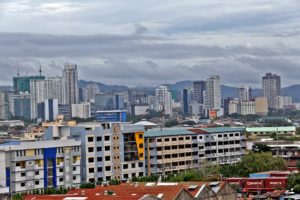
New buildings, ongoing constructions are among the factors which contributed to Cebu City’s wealth. CDN PHOTO/JUNJIE MENDOZA
FOR THE third consecutive year, Cebu City made it to the top five richest cities in the Philippines, maintaining its rank of fourth place for 2017.
This development delighted not only local officials but also members of the private sector.
Cebu City Vice Mayor Edgardo Labella and Councilor Margarita Osmeña, chairperson of the council’s committee on budget and finance, both expressed optimism that Cebu City could clinch the number one spot.
They attributed the city’s continuous inclusion in the list of richest cities to the South Road Properties (SRP), a 300-hectare reclaimed land development in the south district, which is eyed to become the next center of commercial activities.
Members of the business sector, on the other hand, reminded local officials to use the assets wisely.
“This is well and good but I wish Cebu City would spend its wealth for real, expert-based planning and development, and not for political posturing,” said Gordon Alan Joseph, president of Cebu Business Club.
“Cebu City, and too many other cities and municipalities, are choking on unplanned growth and the negative effects are evident: traffic, garbage, pollution, crime, poor infrastructure. This paradigm needs to change otherwise this wealth is of no value to the public,” he added.
In its annual financial report, the Commission on Audit (COA) said Cebu City’s assets last year amounted to P33-billion, which is P1-billion higher than the P32-billion mark made in 2016.
Cebu City landed fifth in the list of wealthiest cities in 2015 after declaring assets of P7.21-billion.
Makati City dethroned Quezon City, a longtime record-holder, in the list of wealthiest cities in the country, after its assets reached up to P196.57-billion in 2017. Quezon City’s assets only amounted to less than half of Makati City, which is at P68.33-billion.
Manila City, ranked 3rd, recorded assets amounting to P38.67-billion.
Meanwhile the news that Cebu province is the richest province in the country elated Vice Governor Agnes Magpale expressed elation over the report of the Commission on Audit (COA) that Cebu is the richest among the the 81 provinces in the country for 2017.
For Magpale, the “richness” of the province should be attributed to individual growth of its 54 towns and component cities which were made the basis of the ranking.
“We are doing our best to help the towns. If you noticed, we are helping the seventh district – the farthest district and the poorest district. Di man ta makadungan nga tarungon tanan pero giagak nato ang mga kalungsoran towards progress,” Magpale told reporters on Tuesday.
But former governor, now Rep. Gwendolyn Garcia questioned whether this wealth is felt by the people in the province.
“Cebu has always been the richest province in the country. Ang pangutana mao: kini ba natagamtam sa mga Sugbuanon? (The question is if the Cebuanos have felt this) ” Garcia said in a message sent to reporters on Tuesday.
Garcia said that the title of being the richest province is empty if it is not translated to real and meaningful benefits for the people.
Magpale however said that the marginalized people have benefited from the wealth of the province.
“We may not be very visible when it comes to big structures but ang mga gagmay nga tawo ang naka-benefit. Sa agriculture for instance, kita ang nagbayad sa premium sa insurance sa farmers. Daghan ang naka-benefit ani considering nga daghan og mga calamities ang niigo recently,” Magpale said.
“We have been very cautious sa atong spending and nagamit gyod sa labing kinahanglan. We always say nga unlimited needs versus unlimited resources. Limited gihapon atong resources, just that comparatively speaking, we are better off than the other provinces,” Magpale added.
Inter-local Council
On Monday, the province entered into a Memorandum of Agreement (MOA) with the eight town mayors of the seventh district and Rep. Peter John Calderon to establish an Inter-local Council.
The seventh district, composed of the towns of Alcantara, Alegria, Badian, Dumanjug, Ginatilan, Malabuyoc Moalboal and Ronda will be the pilot area for an integrated inter-area development program that will facilitate coordination among member local government units (LGUs) that will function like the Metro Cebu Development Council.
Magpale, being the chairperson of the provincial board, also said that they are being extra careful with the Capitol’s expenditure to make sure that it’s “limited resources will be maximized to address the unlimited needs of the province and the
constituents.”